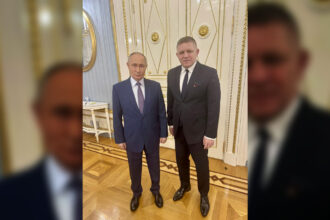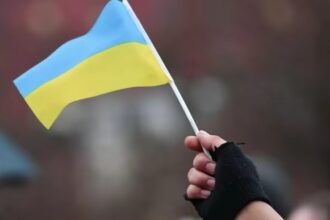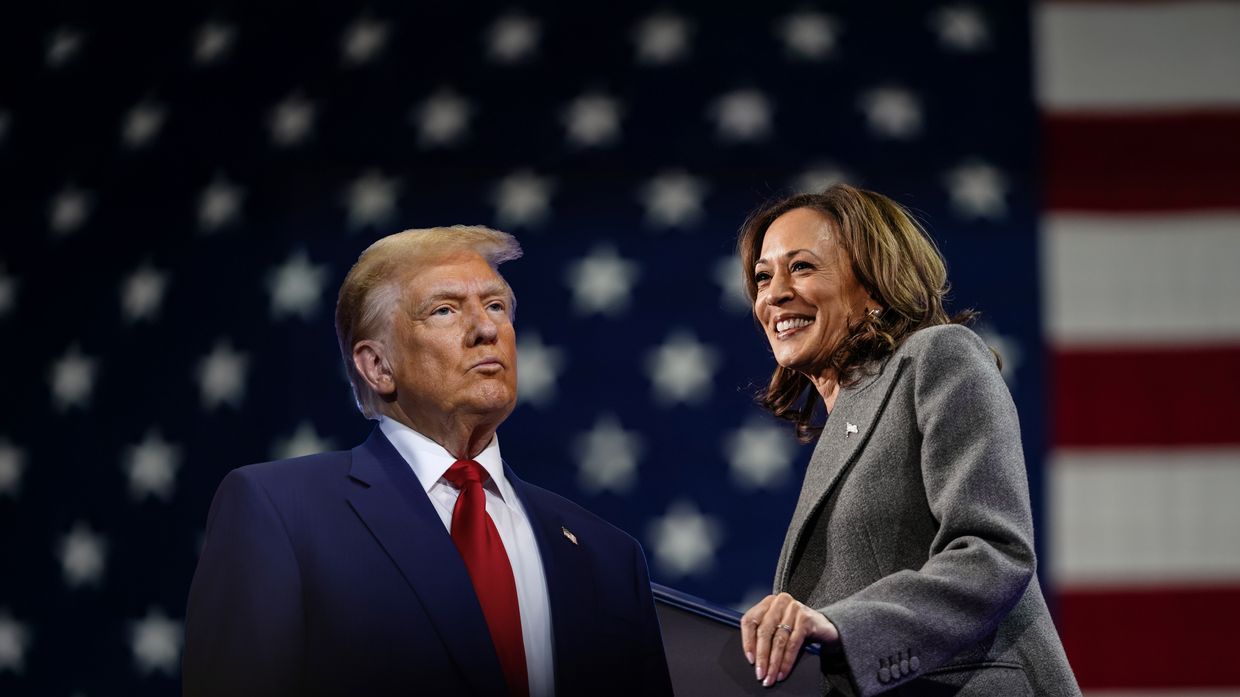(Chip Somodevilla/Getty Images) On December 12, 2023, Ukrainian President Volodymyr Zelensky speaks at a press conference with U.S. president Joe Biden, in the Indian Treaty Room in the Eisenhower Executive Office Building, Washington, DC. (Chip Somodevilla/Getty Images)
Ukraine’s future is at stake ahead of the U.S. presidential elections on Nov. 5. Ukraine’s President has ratcheted up the heat by invoking nuclear weapons as a threat to encourage whoever wins the Oval Office to offer more conventional weapons and robust security assurances to Kyiv.
Volodymyr Zelensky said on October 17 that he told Donald Trump, the Republican presidential candidate who is facing Vice President Kamala Harris in the Democratic ticket, that Ukraine will either join NATO or develop nukes. He retracted that statement later that day, saying that Ukraine did not plan to build a nuclear weapon as a deterrent to Russia’s full scale invasion, which is now in its third anniversary.
Kazuto Suzuki of the Institute of Geoeconomics of the International House of Japan told the Kyiv Independent that Zelensky had mentioned nuclear weapons to call for a further commitment from NATO countries, particularly the United States, in terms of further support for Ukraine.
“He may be thinking that the Ukrainian determination to possess nuclear weapons could give an added reason for a new U.S. President, whoever is chosen.”
Zelensky’s comments about an atomic weapon come as fears grow that U.S. aid for Ukraine could plummet after the election, amid Russia’s accelerating assault in the Donbas. This is especially true with the prospect of Trump returning to the White House, who has criticised aid to Ukraine.
What is the pressure to increase weaponry and open NATO’s doors?
Zelensky made the comment about nuclear weapons in reference to a meeting he had with presidential candidate Trump on Sept. 27, during a trip to the U.S.
Trump has praised Russian leader Vladimir Putin and questioned the future of U.S. aid to Ukraine. He has also promised that he will broker a deal to end the conflict in Ukraine. There is speculation that he may pressure Kyiv into granting territory to Russia, or accepting Putin’s terms.
“I told Donald Trump that either Ukraine would have nuclear weapons as protection or it would be part of an alliance. We do not know any other alliances that are as effective as NATO,” Zelensky told EU leaders in Brussels on October 17, when he presented his plan for victory.
Zelensky continued, “I think Trump heard me. He said it was a reasonable argument.”
Later that day, Zelensky reversed his statement during a press conference held with NATO Secretary General Mark Rutte.
“We never talked about… preparing nuclear weapons or anything like this,” he added, adding that his comments referred to Ukraine’s giving up its nuclear weaponry in 1996 in exchange of the protection provided by three nuclear states – the U.S.A., U.K. and Russia. The agreement is called the Budapest Memorandum.
Stefan Wolff, Professor of International Security at the University of Birmingham said that “Trump may be more receptive to the idea of Ukraine having nuclear weapons” but “it is a non-starter no matter who wins” the U.S. elections.
He added, “I could see (Trump), using the threat to allow Ukraine to have nuclear arms as part of whatever he believes he will negotiate Putin.”
Some commentators claim that Zelensky’s statement about nuclear weapons was a bluff, and a way to exert pressure.
“Clearly, he was trying leverage with the U.S., and other NATO members, for a stronger commitment for Ukraine to NATO membership, but with regards to the U.S. elections specifically, he appears to be trying position himself so that he can have a decent relation with whomever is elected,” Lynn Rusten told the Kyiv independent.
Claus Mathiesen is a lecturer and former military attache at the Danish Defense Academy. He said that several countries were considering nuclear weapons due to uncertainty about U.S. post-election policy and the possibility that the U.S. would reduce its commitment to NATO in the event of a Trump victory.
Mathers, Jenny, a lecturer on international politics at Aberystwyth University in the U.K., believes that Zelensky’s initial statement was likely intended to shock Ukraine’s Western backers into realizing that Kyiv needs a more robust security guarantee than what the West has offered so far.
She said Zelensky’s statement could “jolt” the West into changing its perception and seeing the possibility of Ukraine joining NATO sooner rather than later, as the least risky future.
According to Wolff “the debate indicates that there is a certain desperation in Kyiv due to the lack of Western follow through on the tough but often empty rhetoric that is frequently displayed.”
According to a U.S. government analyst and diplomat, Zelensky’s statement has already affected Ukraine’s Western partners. He spoke under the condition of anonymity as he wasn’t authorized to speak to journalists.
The diplomat said that although Western allies do not see a Ukrainian nuke program as realistic, they understand Zelensky’s message that Ukraine is in a desperate situation and needs security guarantees.
“Zelensky’s message is very clear,” he said. “The West is catching on.” Before September, NATO invitations had not been considered. “But now, the topic of inviting Ukraine into NATO is back on table.”
Oleg Sukhov works as a reporter for the Kyiv Independent. He was a former Moscow Times editor and reporter. He holds a master’s in history from Moscow State University. He moved to Ukraine due to the crackdown in Russia on independent media and covered wars, corruption, reforms, and law enforcement.
Read More @ kyivindependent.com




